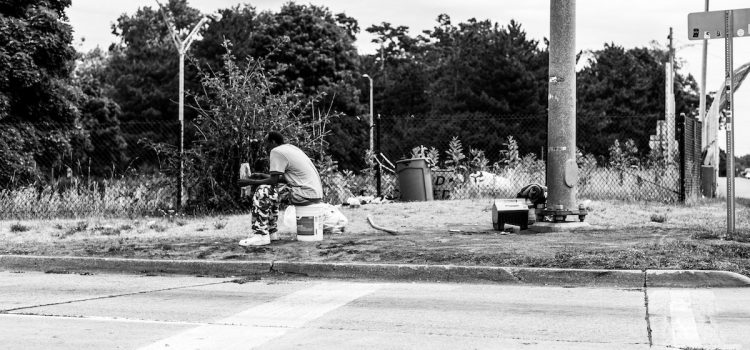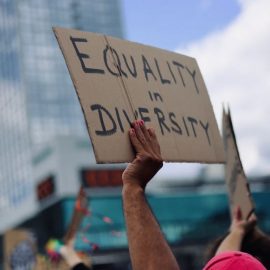

This article is an excerpt from the Shortform book guide to "Blackout" by Candace Owens. Shortform has the world's best summaries and analyses of books you should be reading.
Like this article? Sign up for a free trial here.
Why are Black people poor? Is there a way out of generational poverty?
Candace Owens believes that Black Americans are stuck in generational poverty because of the breakdown of families. This breakdown, she says, comes from Democratic policies. That’s why it’s time for Blacks to leave the “Democratic plantation” and embrace true independence and prosperity.
Continue reading to understand what Owens means—and what she hopes will change.
Why Are Black People Poor?
Why are Black people poor? Owens believes that a sinister agenda accounts for the widespread generational poverty among Black Americans.
Social safety nets, such as TANF (commonly known as “welfare”), SNAP (“food stamps”), WIC, and Section-8 housing are programs supported by Democrats. They say that the programs are intended to help struggling individuals and families get back on their feet. Owens, however, has a more cynical perspective. She believes that these social services are used by the government to accomplish two things: to keep Black mothers single and to create reliance on their party.
From Owens’s perspective, social services keep Black mothers single because, if they can receive food, money, and housing from the government, then there’s no need to marry the man that impregnates them. The men are free to impregnate as many women as they want without having to face the responsibility of caring for a family. The unfortunate result is a vast increase in children who grow up fatherless and ultimately end up in prison. This system feeds itself and keeps Black people at the most powerless levels of society.
(Shortform note: An impact review was recently conducted on the effects of single-parent households on a child’s likelihood to graduate from college or be incarcerated. White and Black subjects were both included, and the results were the same for both races: Children who were raised by single parents were more likely to go to jail or prison, and were less likely to graduate from college. One critic of these studies, an associate professor at Harvard, presented data that argues that two-parent households are not a silver bullet and will not ensure academic success for Black children. Her results demonstrated that economic stability was the most important factor when determining whether a child would do well academically.)
Owens says that Democrats also like to give out social services because it creates dependency. The longer a person is on welfare, the more difficult it is to pull themselves out of it. And, if they were to vote a Republican into office, this hand that’s feeding them could very well disappear.
LBJ created these services in 1964 as part of his “Great Society” initiatives. Owens says that LBJ (a known racist with a penchant for using the “n” word) spoke of his initiatives and allegedly said to two governors, “I’ll have those n*ggers voting Democrat for the next two hundred years.” (Shortform note: According to Snopes, this quote is widely cited but there is no evidentiary proof that LBJ said it.)
(Shortform note: A recent survey found that 59% of Americans believe that Black people receive the same or more social supports than do white people. The truth is quite the opposite—in food stamps and Medicaid, white recipients outnumbered Black ones. For food stamps, 32.6% of recipients were white and 25.6% were Black. For Medicaid, whites made up 43% of the recipients, and Blacks made up 18%. Because Black Americans comprise a little more than 13% of the population, these statistics still demonstrate that a larger chunk of the Black community uses these services than does the white community, but perhaps more importantly, it reflects the assumptions, attitudes, and misconceptions of the American people.)
| Breaking the Curse of Generational Poverty More than 20% of Black Americans are currently in the third generation of family poverty. Because we are now three generations away from the Civil Rights Movement, some scholars argue that we have proof that time is not enough for poor Blacks to climb their way out of a poor economic station. Here are three ways the scholars recommend we tackle the issue as a society: First, we need to improve education for Black students of all ages. Many believe education is the key to upward mobility, and the current K-12 system of funding needs major reform. We can infer that Owens would agree with this strategy because she has criticized public schools in Black neighborhoods and advocates for school choice. Next, we need to bolster Black men. To empower Black men to lead their homes and communities, we need to reform the criminal justice system and the education system with them at the front of our minds. Owens would also likely agree with this tactic, as she strongly believes in two-parent households and strong male figures. Finally, we need to eliminate child poverty. While children are in their formative years, we must add social supports to make sure that they never go without a meal or clothing or shelter. By supporting them as they grow, they are more likely to have the tools they need to succeed on their own once they reach adulthood. We can infer that Owens would disagree with this approach because it could be categorized as a “government handout,” although she doesn’t directly discuss social supports for children in this book. |

———End of Preview———
Like what you just read? Read the rest of the world's best book summary and analysis of Candace Owens's "Blackout" at Shortform.
Here's what you'll find in our full Blackout summary:
- How the Democratic Party has been keeping Blacks poor and needy for political gain
- How Democratic policies have destroyed the nuclear family
- Why Black Democrats should jump ship and join the Republicans






